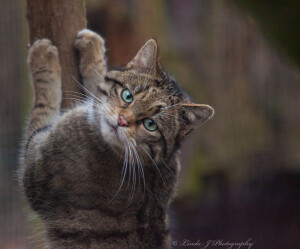
Hello kitty? The Scottish wildcat looks a lot like domestic cats. (Credit: pipilongstockings / Wikimedia Commons)
When I wrote my book, Citizen Canine, nearly 10 years ago, one of the first things I covered was an unusual case in Scotland. It seems that in 1990 a gamekeeper had shot three cats on a grouse moor. His aim, as it were, was to protect the birds from felines so that they could be killed by hunters instead. He was within his rights–assuming that his targets were domestic cats. But witnesses took him to court, claiming that he had killed endangered Scottish wildcats instead. The two animals look remarkably similar (as you can see from the picture) so only DNA could tell whether the hunter had broken the law. The problem? No one had a genetic way to distinguish the two felines.
Cases like this led to one the most important finds in cat science: A rigorous analysis of domestic cat DNA revealed that all of our kitties had descended from the African–or Near Easter–wildcat. The research also led to a way to genetically tell Scottish wildcats and domestic cats apart. And that, in turn, has recently revealed something tragic.
Two new studies of domestic felines and wildcats based on modern and ancient DNA find that the Scottish wildcat is effectively extinct. Though domestic cats and wildcats in Europe appear to have cohabitated for thousands of years without interbreeding, something changed in Scotland about 70 years ago. Declining prey and loss of habitat appear to have driven the few Scottish wildcats left to mate with domestic cats. Today, the DNA of Scottish wildcats is so corrupted by domestic cat DNA that all that exists in nature is a “hybrid swarm”–felines with a confused mix of wild and domestic DNA.
There is a small shred of hope. Scottish wildcats kept in captivity since the 1960s could help repopulate the animal in the wild. But even these felines have some domestic DNA, so it could take several generations for them to become pure wildcats, if that’s even possible. As for the gamekeeper, the court couldn’t prove that he had shot Scottish wildcats, and it was forced to drop the case. Perhaps the wildcat will fare better in the hands of conservationists.

